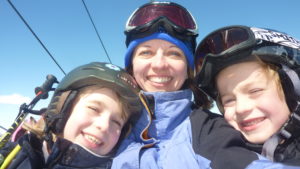Attachment is a Primal Need
It’s very important to have a close relationship with our children as it’s through this relationship that we are able to be their compass point and influence them. As I discussed in Are You a Boss or a Leader? and in Authoritarian Parenting Styles, the top-down power parenting approach may work for a while but eventually the child’s armour goes up, she/he no longer wants to communicate with you and certainly doesn’t feel compelled to do as you say! What’s the other alternative? Attachment. Attachment is a primal need, even more so than having food. A close relationship instinctively activates a child’s desire to be close, to cooperate, to follow our direction, and to turn to us for help. Research has proven that the best predictor of a healthy and resilient teenager, is a close connection to at least one parent.
A strong emotional connection with at least one parent or significant adult figure reduces the odds that an adolescent will suffer from emotional stress, have suicidal thoughts or behaviour, engage in violence or use substances. (Journal of the American Medical Association, 278(10), 823-32,1997)
The other important point to remember is that all relationships (parent/child, spousal, friendships) always need tending to, just like a plant, or they too will wilt and wither. Just because one was close to a child when he/she was young does not mean that the effects will last – there needs to be a continuous connection.
How Do You Strengthen the Bond?
The Stages of Attachment
Dr. Gordon Neufeld and Dr. Gabor Maté have written an excellent book, Hold onto Your Kids: Why Parents Matter, in which they have outlined the six stages of Attachment. In this article I have summarized the first three stages and I will continue with the last three stages next week.
1) Proximity
This is the first and most primary need that begins in infancy. The feeling of being close, touched, and in contact starts the foundation for attachment. By asking your child to be with you such as playing a game, going for a walk, or doing an activity together, you are seeking proximity thus the child feels connected and attached. If your child does not feel this secure attachment he/she will be more inclined to look to peers for proximity and attachment. As I have mentioned before, bed-time is an opportune time for seeking out proximity. Reading stories, cuddling in bed, back scratches and tucking them in fills them up as they end the day. Even when children are old enough to read their own books, they still love to have stories read to them and for teenagers, just flipping through magazines together while hanging out on the bed is a way of initiating proximity. *Remember to keep these bed-time routines going in order that it is part of a natural routine and won’t be resisted when your child becomes a teenager.
2) Sameness
The next important stage is having something in common with this significant other. Our children usually want to be like us because this “sameness” fuels attachment and security, thus they naturally seek out ways to be like us. When children are young it is sometimes easier to find things to do together or when they are babies, make faces and blow “raspberries” together. As they get older, it may take more effort on our part, to find common interests, create opportunities and share experiences that are of interest to our children. However, if we don’t, it becomes very easy for peers to take our place and fulfill the need for “Sameness”.
3) Belonging or Loyalty
This third stage of Attachment strengthens the relationship bond by demonstrating that we’ve got their “back”. If children feel that their parents are in their corner, ready to support and guide them, they will feel more securely attached. If you and your child are always at odds, your child will not feel a sense of belonging or loyalty and again will turn to peers to find allies. However, peers are not ideal compass points, nor unconditionally loyal, which usually leads to anger, aggressiveness and/or assumed inadequacy.
When in doubt…connect! Parenting can be such a challenging job, but strengthening the relationship will always be beneficial.
Personally, I love to ski, when possible, with my kids because they can feel all three of these levels. As we ski together, enjoy the same sport and if and when they fall, they know I’m there for them, helping them get their skis back on!
Think P*S*L – Proximity – Sameness – Loyalty.
Happy weekend,
Warmly,
PS. To read about the last three stages of attachment, click here.
Want to Connect?
Subscribe now to receive free weekly parenting tips and inspiration.









3 thoughts on “Strengthening the Bond with Your Child Through the Six Stages of Attachment”
Comments are closed.